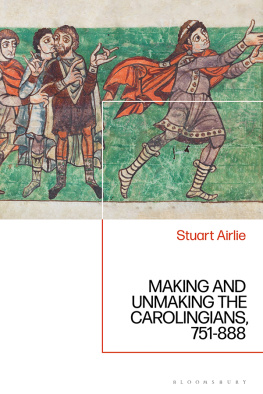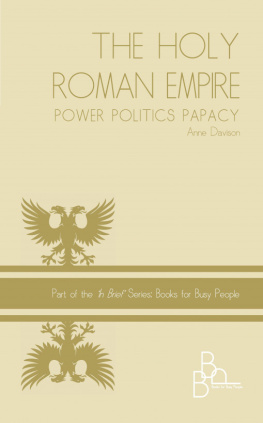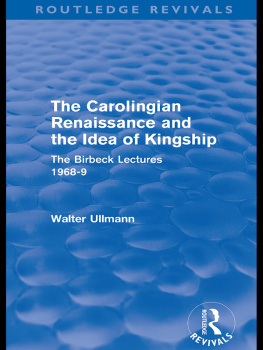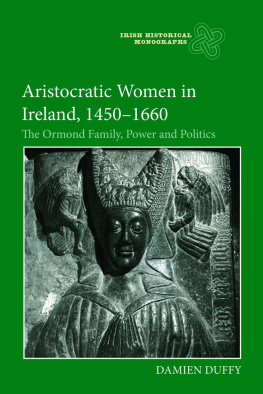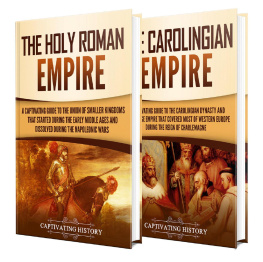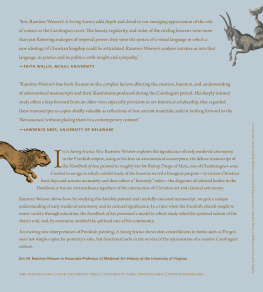Also in the Variorum Collected Studies Series:
JOHN J. CONTRENI
Learning and Culture in Carolingian Europe
Letters, Numbers, Exegesis, and Manuscripts
HENRY MAYR-HARTING
Religion and Society in the Medieval West, 6001200
Selected Papers
WENDY DAVIES
Brittany in the Early Middle Ages
Texts and Societies
WENDY DAVIES
Welsh History in the Early Middle Ages
Texts and Societies
WALTER GOFFART
Barbarians, Maps, and Historiography
Studies on the Early Medieval West
JANET L. NELSON
Courts, Elites, and Gendered Power in the Early Middle Ages
Charlemagne and Others
SIMON COUPLAND
Carolingian Coinage and the Vikings
Studies on Power and Trade in the 9th Century
ANN FREEMAN
Theodulf of Orlans: Charlemagnes Spokesman against the Second Council of Nicaea
JANET L. NELSON
Rulers and Ruling Families in Early Medieval Europe
Alfred, Charles the Bald and Others
JANE MARTINDALE
Status, Authority and Regional Power
Aquitaine and France, 9th to 12th Centuries
ROGER COLLINS
Law, Culture and Regionalism in Early Medieval Spain
VARIORUM COLLECTED STUDIES SERIES
_________________
Power and Its Problems
in Carolingian Europe
_________________
Stuart Airlie
_________________
Power and Its Problems
in Carolingian Europe
_________________
First published 2012 by Ashgate Publishing
Published 2016 by Routledge
2 Park Square, Milton Park, Abingdon, Oxon OX14 4RN
711 Third Avenue, New York, NY 10017, USA
Routledge is an imprint of the Taylor & Francis Group, an informa business
This edition 2012 by Stuart Airlie
Stuart Airlie has asserted his moral right under the Copyright, Designs and Patents Act, 1988, to be identified as the author of this work.
All rights reserved. No part of this book may be reprinted or reproduced or utilised in any form or by any electronic, mechanical, or other means, now known or hereafter invented, including photocopying and recording, or in any information storage or retrieval system, without permission in writing from the publishers.
Notice:
Product or corporate names may be trademarks or registered trademarks, and are used only for identification and explanation without intent to infringe.
British Library Cataloguing in Publication Data
Airlie, Stuart.
Power and its problems in Carolingian Europe.
(Variorum collected studies series ; CS 1010)
1. Carolingians History. 2. Europe, Western History.
3. Power (Social sciences) Europe History.
I. Title II. Series
944014dc23
ISBN 978-1-4094-4600-2
Library of Congress Control Number: 2012932939
ISBN 9781409446002 (hbk)
VARIORUM COLLECTED STUDIES SERIES CS1010
CONTENTS
Bonifatius - Leben und Nachwirken. Die Gestaltung des Christlichen Europa im Frhmittelalter, eds F.J. Feiten, J. Jarnut, and L.E. von Padberg. Mainz: Gesellschaft fr Mittelrheinische Kirchengeschichte, 2007
Der Dynastiewechsel von 751. Vorgeschichte, Legitimations Strategien und Erinnerung, eds M. Becher and J. Jarnut. Mnster: Scriptorium, 2004
Transactions of the Royal Historical Society, 6th series, 9, 1999
Charlemagne. Empire and Society, ed. J. Story. Manchester: Manchester University Press, 2005
Staat im frhen Mittelalter, eds S. Airlie, W. Pohl and H. Reimitz. Vienna: Verlag der Osterreichischen Akademie der Wissenschaften, 2006, pp. 93111
Charlemagnes Heir. New Perspectives on the Reign of Louis the Pious (814840), eds P. Godman and R. Collins. Oxford: Clarendon Press, 1990
Courts and Regions in Medieval Europe, eds S. Rees Jones, R. Marks and A.J. Minnis. Woodbridge: York Medieval Press, 2000, pp. 120
La royaut et les lites dans LEurope carolingienne, ed. R. Le Jan. Lille: Centre dHistoire de lEurope du Nord-Ouest, 1998
Lay Intellectuals in the Carolingian World, eds P. Wormald and J.L. Nelson. Cambridge: Cambridge University Press, 2007
Past and Present 161, 1998
Nobles and Nobility in Medieval Europe, ed. A.J. Duggan. Woodbridge: Boydell and Brewer, 2000, pp. 2441
Narrative and History in the Early Medieval West, eds E.M. Tyler and R. Balzaretti. Turnhout: Brepols, 2006
The Journal of Ecclesiastical History 43, 1992
This volume contains xviii + 308 pages
These papers have been written over a period of some fifteen years and more. Naturally, my views have changed and, I hope, deepened over that time, not least due to the impact of work by other scholars. Nonetheless, there is consistency of concerns and argument here and the papers have been selected and arranged to form a book, something more than the sum of its parts. My focus is on power and authority in the Carolingian world, from the origins of Carolingian royal authority in the mid-eighth century to the disintegration of that dynastic hegemony at the end of the ninth. This is not a story of an upward struggle to rise to a relaxing plateau of achievement and then a slip down a sloping fall. The Carolingian dynasty could not relax once it gained the royal throne in 751; it had to maintain its seized power in a cloak of legitimate authority and it had to do this continually.
Such struggles for political power and authority are of course only one feature of the Carolingian era, as that era itself is only one part of the history of the early medieval west. And the Carolingian period can no longer dominate early medieval historiography as a master-narrative of a successful formation of a distinctively (western) European identity. The figure of Charlemagne as father of Europe may not resonate now as it did after the great exhibition held at Aachen in 1965 under the auspices of the Council of Europe. Europe is bigger now, much less sure of its direction, and so starting-points as well as destinations are too problematic and various for a made in Francia label to cover them. While 1999 saw valiant efforts made to remind Europeans (including those in the British Isles) of Charlemagnes impact with great exhibitions in Paderborn, Brescia, Barcelona, Split and, on a smaller scale, York, the Council of Europes exhibition of 20002002 was on Europes Centre around 1000 and was to be displayed in Budapest, Cracow, Berlin, Mannheim, Prague and Bratislava. Such work tends to revel in the variety of early medieval cultures, of which the Carolingian realm is only one, and if I were writing these papers now, I would myself doubtless try to incorporate more comparison across space and time, and to draw more on studies of material culture.
The point about such comparisons, however, is not to point out parallels between Carolingian culture and others, or to spot continuities across time, but to render more clearly what is distinctive about the Carolingian era itself. More work, as they say, is needed here. Even the chronological span of this period is a bit fuzzier than it could be. While the start of Carolingian royalty is relatively clear-cut with the 751 coronation of the first Carolingian king Pippin, confusingly known as Pippin III, the end is historiographically less secure. The last Carolingian king was Louis V, whose death in 987 marked the end of one royal dynasty and the start of another, the Capetians. Yet the valuable recent survey,


